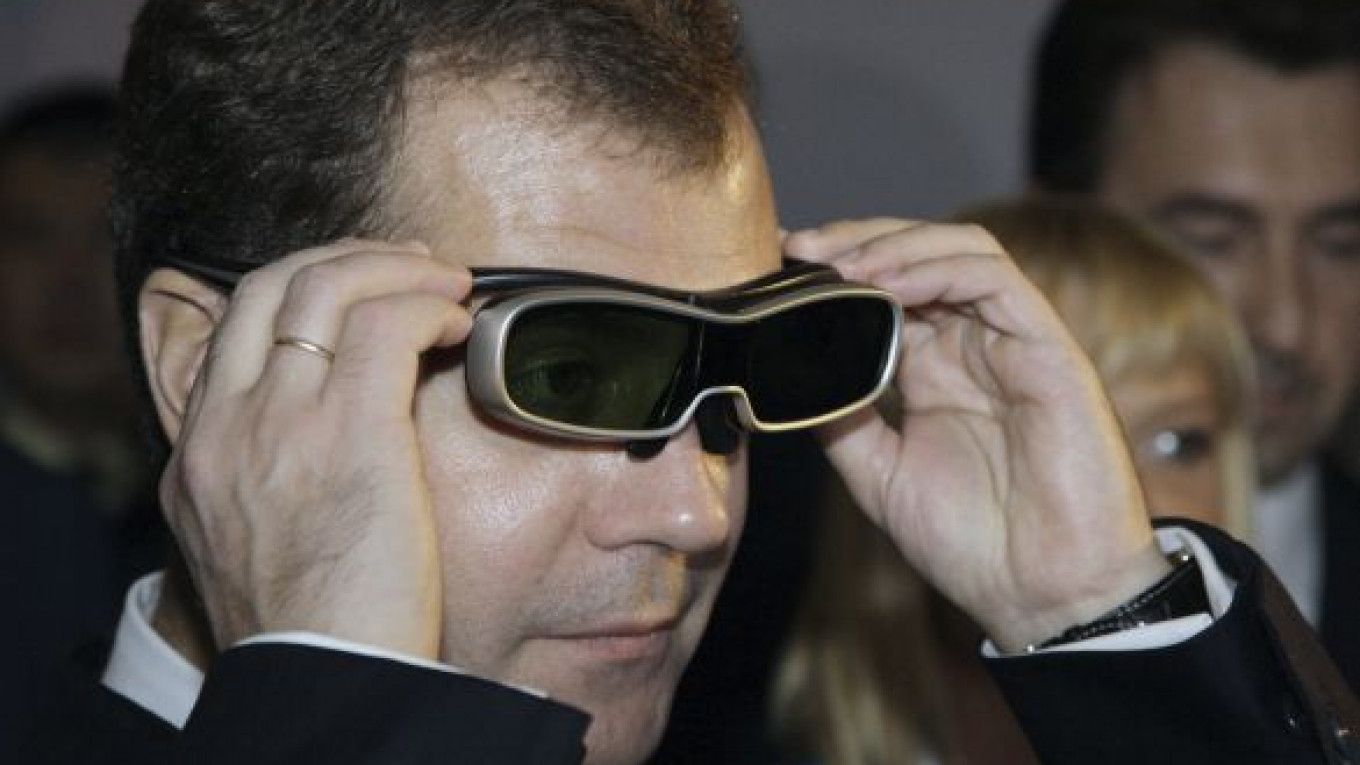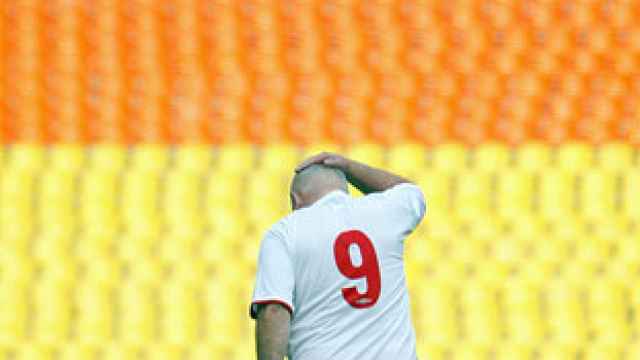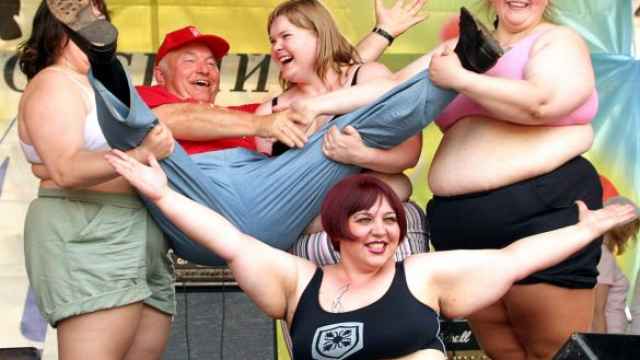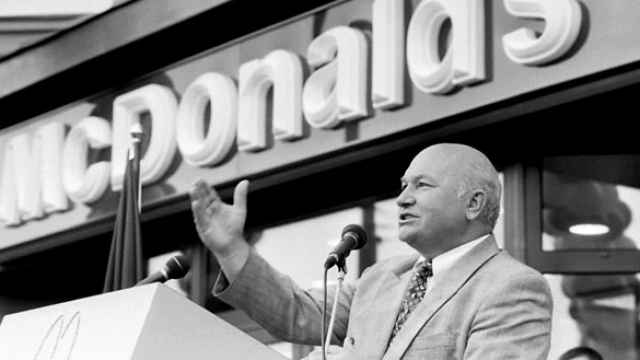"Wow! It looks like we've got a president after all."
This was the typical reaction from political commentators in the Russian blogosphere Tuesday after the news emerged that President Dmitry Medvedev had fired the entrenched and defiant Mayor Yury Luzhkov — and many political analysts agreed.
The dismissal represents Medvedev's biggest power play since his predecessor, Vladimir Putin, installed him in the Kremlin in 2008. Moreover, unlike many previous political decisions announced by Medvedev, this one is widely being perceived as his own, rather than one devised by the Medvedev-Putin tandem.
"This was a lesson for all the Russian elites, and this strongly added to Medvedev's clout over the country's political system," said Tatyana Stanovaya, a political analyst with the Center for Political Technologies.
Luzhkov’s dismissal marks the first time that Medvedev has used the humiliating and harsh excuse that he had “lost confidence” in a regional leader, and he said other regional bosses might be sacked for the same reason.
Putin has used this excuse only three times to fire regional leaders. But none of them came anywhere close to wielding the clout that Luzhkov did in the Kremlin's vertical of power, where Luzhkov was a critical pillar responsible for the biggest and most politically active subject in the Russian Federation, the city of Moscow.
Shortly after becoming president, Medvedev strived to project himself as an independent decision maker, insisting that he sought Putin's advice rather than guidance on important issues.
The first test of his resolve came with the war with Georgia in August 2008, and
Medvedev repeatedly and publicly claimed afterward that he had made the ultimate decision to send Russian troops to Georgia. His statements were met with some doubt, even by Georgian President Mikheil Saakashvili, whose animosity with Putin is well documented.
Medvedev's other major political initiatives, like police reform, battling corruption and the creation of the innovation center in Skolkovo, have been widely viewed as naive, wishful thinking, mainly perhaps because few heads have rolled in the police and anti-corruption reforms.
The decisive removal of Luzhkov is the biggest evidence of Medvedev's political solvency so far and a major step toward strengthening his position ahead of the 2012 presidential election, said Stanovaya and Alexander Morozov, head of the Center for Media Studies, a think tank.
Luzhkov grew overly confident after striking a deal with Putin, who appointed him to a fourth term in 2007, and allowed himself to neglect Medvedev, Stanovaya said. Medvedev forced Putin into a corner by escalating a faceoff against Luzhkov in recent weeks, leaving Putin with the choice of either dumping Luzhkov or shattering the stability of the ruling tandem, she said.
Morozov described Luzhkov's dismissal as a big move but said it represented just another step in Medvedev's gradual effort to build his own power configuration that would rule Russia for the next decade.
He ticked off a list of Medvedev initiatives that marked strong departures from Putin's foreign policy course, including a return to membership talks with the World Trade Organization, closing a gap with NATO and supporting Iran sanctions in the United Nations.
Stanovaya added Medvedev's decision in late August to suspend construction of a highway through the Khimki forest, a project previously approved by Putin.
"Look, no new political actors have emerged in Putin's camp. Whatever political life is taking place is around Medvedev," Morozov said, referring to a recent flurry of efforts to create public groups backing Medvedev's modernization agenda.
If there is a conflict in the tandem over the distribution of power, Putin could have put an end to all these developments swiftly, Morozov said, suggesting that Medvedev was thus being groomed to run in 2012.
Moving forward, Medvedev faces a new test in selecting the next mayor and a chance to prove that his talk of modernization is not empty rhetoric, said Sam Greene, deputy director of the Carnegie Moscow Center.
It is not so important who will be appointed to run Moscow but how the next mayor will proceed, he said, adding that the mayor will need to demonstrate tolerance toward the opposition, allow more pluralism, revise Luzhkov's scandalous general plan for the city's development and treat historical buildings with more respect.
If Medvedev doesn't push for these developments — which carry certain political risks for the Kremlin given the higher than average political activism of Muscovites — Luzhkov's dismissal will not further increase Medvedev's chances of becoming the main national leader, Greene said.
Stanovaya said Tuesday's firing gives Medvedev some freedom in dealing with Putin in his bureaucratic struggle to create his own presidential administration by purging guardians left by Putin to keep an eye on him.
Medvedev's chief of staff, Putin ally Sergei Sobyanin, is widely tipped as a leading candidate to succeed Luzhkov. If Sobyanin is appointed mayor, Medvedev may then demand that his own man be installed as his chief of staff, Stanovaya said.
A Message from The Moscow Times:
Dear readers,
We are facing unprecedented challenges. Russia's Prosecutor General's Office has designated The Moscow Times as an "undesirable" organization, criminalizing our work and putting our staff at risk of prosecution. This follows our earlier unjust labeling as a "foreign agent."
These actions are direct attempts to silence independent journalism in Russia. The authorities claim our work "discredits the decisions of the Russian leadership." We see things differently: we strive to provide accurate, unbiased reporting on Russia.
We, the journalists of The Moscow Times, refuse to be silenced. But to continue our work, we need your help.
Your support, no matter how small, makes a world of difference. If you can, please support us monthly starting from just $2. It's quick to set up, and every contribution makes a significant impact.
By supporting The Moscow Times, you're defending open, independent journalism in the face of repression. Thank you for standing with us.
Remind me later.







